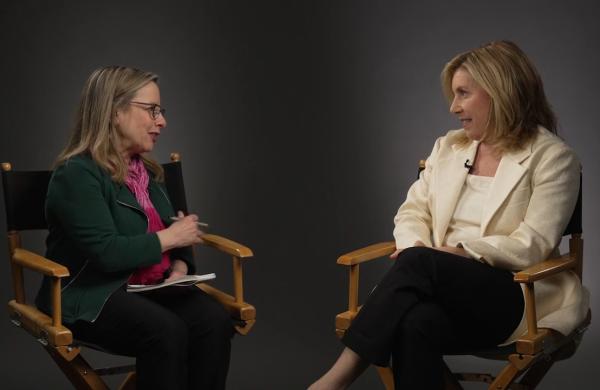For David Nelms, chairman and CEO of Discover Financial Services, thriving in the payment business means keeping pace with constant change. For example, soon-to-be-released chip cards promise a new security front against data breaches, and plastic could be moving toward obsolescence as digital wallet apps take over at the cash register. Nelms only wishes it all would happen faster.
Rather than resist new technologies, payment services provider Discover has long chosen to evolve with them. In August 2012 the Riverwoods, Illinois–based company announced that it would partner with PayPal to allow merchants on Discover’s network to accept the online payment system’s digital wallet services. That same month Discover joined forces with Google Wallet by allowing card members to make in-store purchases with Google’s app or save their card information for payments online. In 2010 it launched Discover Zip, a stick-on card that lets users pay by tapping their phone or other device on a card reader.
“Discover’s been more willing than the bigger players to partner with technology companies to create an alternative payment mechanism, as they’ve done with PayPal,” says Sanjay Sakhrani, a New York–based consumer finance analyst at investment bank Keefe, Bruyette & Woods.
Discover is the No. 6 U.S. credit card issuer worldwide, and unlike rival credit card settlement networks Visa and MasterCard, it is also a bank, so it issues cards directly and offers other banking services. Visa and MasterCard are the largest and second-largest of the four credit card networks, respectively, followed by Discover and American Express Co., ranked by cards in circulation.
American Express is the other major vertically integrated credit card provider, but its business skews heavily toward spending services, most notably the fees that merchants pay when they charge customers’ cards. By comparison, roughly 75 percent of Discover’s revenue comes from loans. Discover earned $2.3 billion in net income in 2014, versus $765 million in 2010. The company’s stock price has climbed from about $18 at the end of 2010 to $57.63 as of April 1.
Nelms says digital wallets will prove increasingly important, but right now he’s focused on mining the significant growth opportunities he sees in loan products. Since joining what is now Discover as president and COO in 1998, almost a decade before the company was spun off from Morgan Stanley, the 54-year-old has diversified the business by expanding into banking areas like personal and student loans. In fiscal 2014 those were two of Nelms’s star areas: The company originated $1.2 billion worth of student loans, making for 22 percent growth year-over-year, and almost $3 billion in personal loans, up 19 percent.
In February 2013, Discover ventured into another new banking service — checking accounts — with the launch of Discover Cashback Checking, which pays 10 cents to customers’ rewards accounts for every debit card, online bill payment and check transaction. Nelms says he’s currently most excited about this product, which just broke the 100,000 mark for new accounts.
“We look forward to having consumers, just as they did with credit cards years ago, move from the traditional banks to the direct players,” says Nelms, a St. Petersburg, Florida, native who holds an MBA from Harvard Business School and served as vice chairman of credit card company MBNA America Bank before moving to Discover. “This will be a significant emphasis for us over the next five to ten years.”
Some investors have expressed concern that Discover is not yet one of the banks partnered with Apple Pay on its new digital wallet platform, but for now there’s no reason to worry, according to Moshe Orenbuch, a consumer finance analyst at Credit Suisse Group. “From a realistic standpoint, Apple Pay makes zero difference to Discover’s business in the short run,” New York–based Orenbuch says. “Though in five years, that’ll be a different story.”
In the coming years Discover will need to focus on bringing in a broader cross-section of customers. About 1 in 4 U.S. households uses its plastic, but “that leaves a lot of people who don’t have the Discover card,” Orenbuch notes.
Nelms can expect competition to grow even fiercer. Credit card companies have been stepping up their rewards programs in an effort to lure new customers, prompting Discover to spend $178 million last year on making it easier to redeem rewards. Given that Visa and MasterCard are much bigger and accepted at more merchants worldwide, Discover can’t afford to skimp on such investments. There’s also the chance that slower consumer spending could cut into the company’s core loan business.
Contributing Writer Katie Gilbert recently spoke with Nelms about how he plans to keep Discover one step ahead.
Institutional Investor: Are new technologies and ever-evolving mobile payment systems disrupting your business?
I would actually say they’re expanding and extending our business. To some degree, as a leader in direct banking, we are sort of the disrupter. We have one branch, we rely on technology, and that is creating all sorts of new opportunities with two-way texting, instant communication with consumers and new capabilities to integrate at point of sale with special offers from merchants. That is something that, as a focused direct bank, we really love and take full advantage of.
Consumers are changing dramatically. Everything is moving toward direct. In payments there are lots of [digital] wallets, most notably at the moment Apple Pay. But they still fundamentally rely on the credit card companies and networks. They have to settle back to a bank account in the case of debit or to a credit account in the case of a credit card. We see it as a great opportunity to get more value to consumers and to partner with these new players. None of them want to become a bank holding company or make credit card loans. Discover’s the last new network point of sale [to enter the market] that’s been in existence and successful. It’s really hard to do. Why would someone want to do that when they could partner with us very inexpensively?
Do you predict that Apple Pay will lead the mobile payments market? Will it be important for Discover to be part of that platform?
It will be important, especially as there are more places to use Apple Pay. We are in discussions with Apple. I would expect we would be part of it at some point.
We’ve been first in most of the other efforts. Apple Pay was a little unique in that they launched with six partners. I think we’ll look forward to them having broader consumer availability. By year end there will be many more places to use it, and by that time I think it’ll become more important for us to be in the wallet.
How soon could the U.S. start to look more like Europe when it comes to adopting chip and PIN credit cards?
I hope it goes to chip and PIN at some point. We’re certainly prepared to support that. In the near term it’s going to be mostly chip and signature. By October of this year, Discover and the other three networks will have put in place a set of incentives for the merchants to upgrade their terminals, and the banking industry is in the process of reissuing about 575 million cards this year with chips on them. I expect there may be as many as 12 million terminals upgraded at the point of sale.
That’s the bigger challenge: for merchants to get the equipment in place. That’s more expensive, and it’s more difficult, but I think it’ll happen. I think it’ll be kind of a two-for-one: People will get chip card capabilities, and merchants’ terminals will accept Discover Zip.
What incentives is Discover offering to merchants?
If a merchant is invested in the chip card technology, they’re not going to be responsible for the fraud liability from a chip card. They’ve got a big incentive to reduce their fraud costs, as do the banks. We want to reduce the potential for hackings or other security breaches of the current technology.
What is Discover’s motivation to offer these incentives?
Frankly, I was hoping that things would move more rapidly to the phone a few years ago, and that we as a country would leapfrog Europe and other places. Notwithstanding Apple Pay, it’s just taking longer than some of us thought.
After the Target and Home Depot security breaches, the industry felt that we had to go ahead and invest in [these incentives for merchants to accept chip cards], what I view as an interim security technology.
We fundamentally need to accept the expense of putting the terminals in place and reissuing the cards to reduce cyberattacks. That’s not the only thing we have to do, because [the security threat] will migrate to other places when we get tighter at the point of sale. We’ll be doing things with greater security online, and I would like to see greater use of PINs, particularly in debit.
What else is Discover doing to improve security, and how significant a focus is it for the company?
Currently, there are lots of things we do behind the scenes to monitor and authenticate customers. Despite all the headlines, these cards are very secure. If there is an issue, we protect our customers so they’re not liable. It’s actually a very good story.
Think about the size of the losses I have to fraud versus the losses I have to credit. Credit losses are about 230 basis points [annually] — that’s 2.3 percent; fraud losses are less than 10 basis points. So we actually do a pretty darn good job not having lots of fraud.
That’s one reason the industry in the U.S. was slow to take up chip cards: because some of the other things we’ve been doing have been so effective in controlling fraud.
Are any of your efforts to have retailers update their point-of-sale technology to accept chip cards motivated by the possibility of reaching new customer bases or by other profit opportunities?
I’d say chip cards are probably a bit more defensive; they will help to avoid fraud. They do have some other capabilities, but I think I would look to things like wallets as being places where there are lots of other sources of value that can be brought into play.
Beyond wallets, to a large degree the bigger things for us are on the direct banking side and looking at how we expand our relationship beyond credit cards. We’ve become large in private student loans, in personal loans, and we’ve got a direct checking account. Ninety-five-percent-plus of our profits come from direct banking.
Do you see profits from digital wallets starting to become proportionally larger?
I’d certainly like the network to be larger as a percentage, but the opportunities in direct banking are very extensive.
The U.S. is a huge financial services market. It’s moving in the direction of being direct. People are increasingly using their phones, not going to branches. So as I look forward, yes, I’m excited about what we can do in the network with partnerships, but the thing that is going to be most important is what our network can do to further differentiate us as a direct bank and, as a direct bank, how we can take full advantage of the tailwinds that I think direct banking will have.
We don’t have the channel conflicts that some of the other banks have. We can better control service, better focus on the new technologies, integrate our product set, pick and choose which industries we’re in so we don’t have to be in commercial lending, and lots of other things. We can really focus on consumer direct banking and be the best at it.
Do evolving technologies like smartphones and digital wallets just increase the attractiveness of the direct banking business you’re already in, rather than demanding big changes from you?
Exactly. It’s basically additional access for our existing accounts, and it’s added functionality for our existing business. All of these new players need us. They need a network; they need bank account access. They certainly don’t want to be regulated like we are. It’s not a replacement; it’s adding things.
The analogy is that when people started to be able to buy things over the Internet, they didn’t just stop shopping at their local stores. It became both channels. This will be the same way. We’ll likely see a movement toward the digital and the phone and the direct pieces, but they’re all additional capabilities, as opposed to replacement capabilities.
Get more on banking and corporations.






